Translation is a tricky business. There are near-infinite nuances to language, so converting media from one language to another – whether it's text, real-time spoken word, recorded media, or something else entirely – is a huge task. A talented translator is worth their weight in gold, but a bad translator can lead to huge faux pas and brand-shredding image issues in short order.
 So, how do you hire a good translator for your business? Here's our guide.
So, how do you hire a good translator for your business? Here's our guide.The kind of translation you need, and the requirements you have for your translation projects, can make a big difference and limit your options.

Here are a few things to consider.
A good translator will be interviewing you just as much as you're interviewing them and will help you determine the extent of your project and whether or not they're suitable to handle it.
In many content creation areas, the choice between agency and freelancer comes down to a choice between budget and convenience. Not so with translation.
With translation, a freelancer is ideal if you want one or two individuals handling your work consistently, with an ongoing and predictable rate and schedule, a known quality for every translation, and a fixed turnaround time.

Individuals can also be hired as employees for translation. This gives you more stability and loyalty from the translator but also makes it harder to shuffle them around if you don't like the work they produce.
Conversely, agencies are good for one-off translation projects, highly specialized projects you might not trust an individual to handle, or rapid deadline projects where one person might not have the time to complete it, and you can't afford delays. Agencies are also good if you want one piece of content translated into numerous languages rather than just one language.
Machine translation is prone to mistakes, overly-literal translations, and a completely stilted way of producing a finished product that makes it unfit for almost every case. It can be fine for simple word replacement, common phrases, and basic information. Something like Google Lens is great for translating the name of a foreign product, a navigation sign in a subway, or a similar piece of information, but you could never read a book through it.
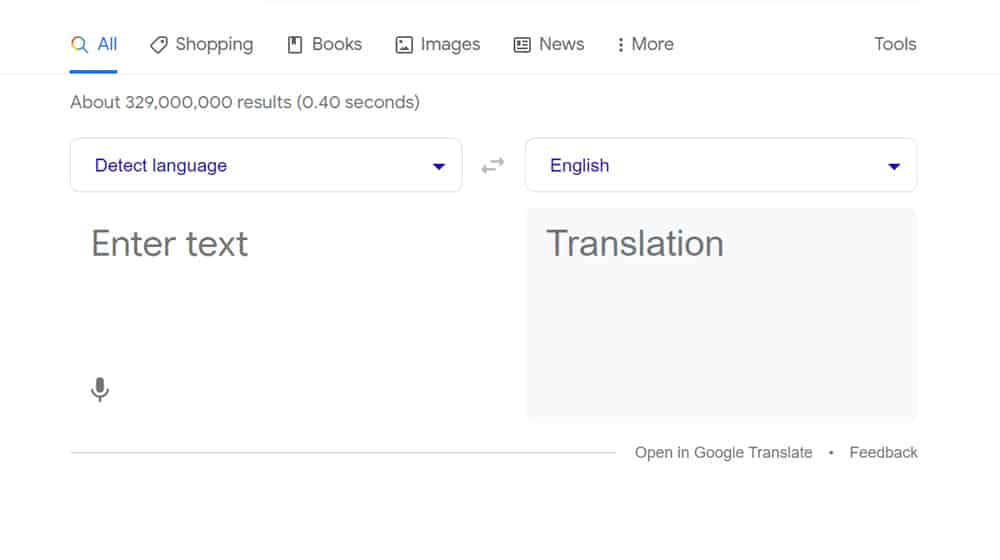
One of the biggest issues with machine translation is that you have to trust it. The machine doesn't explain its word choice, and you can't ask it to justify itself. All you can do is trust that it did it right, and that doesn't help you at all.
Really, machine translation is a useful tool for consumers to translate content in languages they don't understand, enough to assist them in their own daily life or in their pursuit of learning the language. It's not useful for businesses looking to translate content consistently into another language for marketing purposes.
CAT Tools are Computer Assisted Translation Tools, and they're essentially word replacement dictionaries and speed-enhancing tools translators can use to assist them. They don't do the translation work for the translator; rather, they provide a resource of specialized terms, common phrases, and substitutions that cuts down on the work the translator has to do themselves. It's almost always a good thing that your translator uses CAT tools, as it shows professionalism. You can read more about them here.
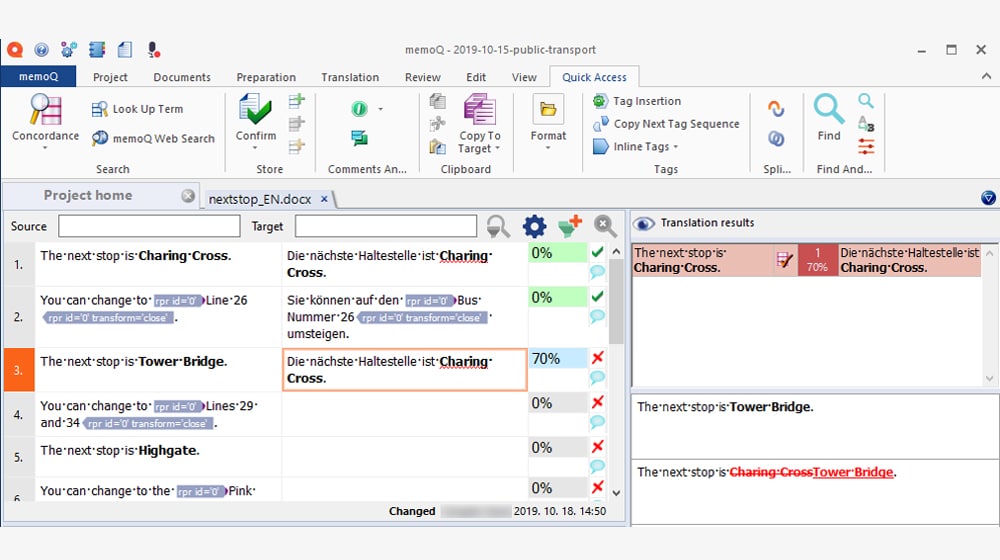
CAT tools give translators a few forms of assistance. They provide a term dictionary, so the translator can look up standard definitions for words and phrases and add their own for specialized and brand terms. They also provide suggestions for some translations to help speed up and streamline the project.
You don't need to know the ins and outs of how CAT tools work; all you need to know is that they aren't machine translation services, they're assistive programs, and they're generally a good thing.
Where can you look when you want to find translators?
If you're looking for an agency, it's simple enough to Google for the language and "translation agency" to see what comes up. You might also use the term Language Service Provider, as some professional agencies use that more formalized term to set themselves apart.
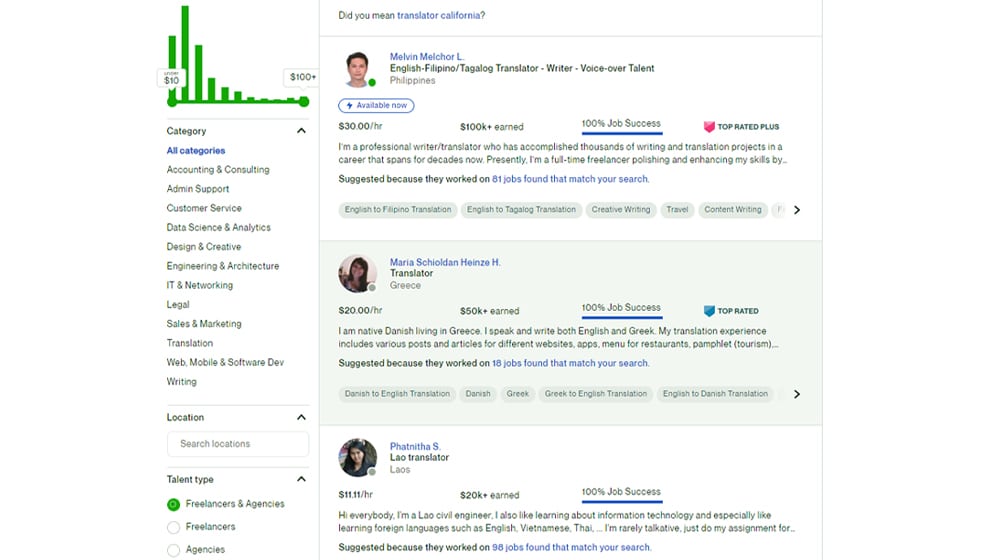
In terms of freelancers, there are a lot of different choices.
There's always going to be some crossover between these platforms, so you'll likely see some familiar names across them all when you start looking.
Finally, you can also look to other companies in the same markets. You can often simply talk to the people working for these businesses and ask them who they use for their translations and see if you can hire the same person or if they have any recommendations. Word of mouth for translation services is common, and it's about the only way to find some of the best translators out there.
A common debate in the world of translation is the difference between translation and localization, and how much liberty can be taken with any given translation. It's an especially frequent debate in media translation, where wordplay and context can matter.
Literal translations convert words into words in the other language and don't pay much attention to the nuance behind them. This is how you frequently find wordplay and jokes that don't work. Localization, meanwhile, is more free to change things to suit the target language to keep the intent behind the statement.

Sometimes, a literal translation loses the whole meaning of a sentence, such as is the case with many puns and wordplay jokes. If your writing relies on being clever with the words you use, localization will generally be better.
Usually, you're going to want something somewhere in the middle. Full localization can change the meaning and intent of the content you produce, and you still want an overall cohesive marketing plan between languages. A literal translation will fall flat, though, so someone who is free to take some liberties but sticks close to the source is usually the best option.
Translators have unions and associations, unlike many other forms of creative content producers. The American Translator's Association certifies translators, and you can verify it on their website. Generally, looking for a certified translator is going to be a good idea.
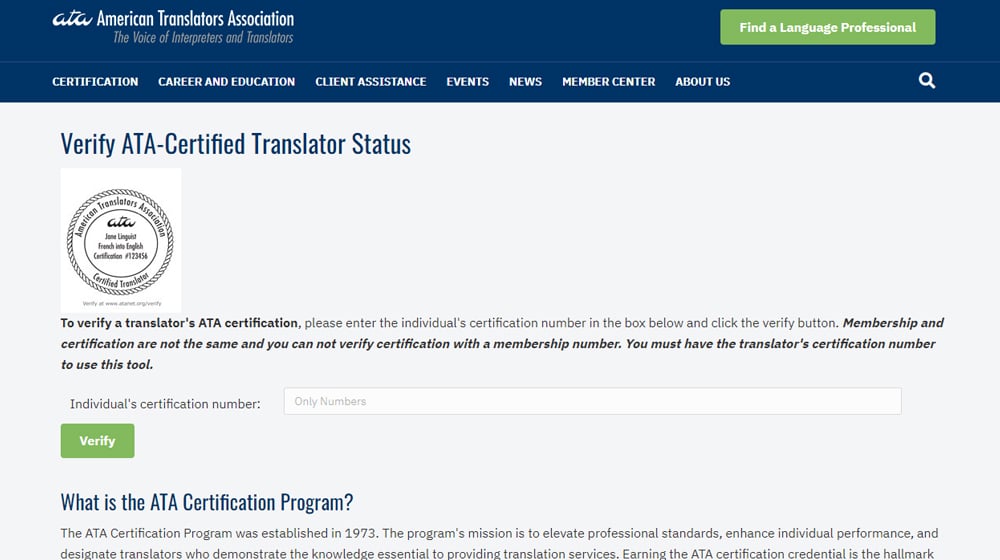
You may also consider checking credentials for specialists in certain industries. If you're getting medical information translated and your translator is a former nurse, you should be able to look up that information.
Various certifications can be helpful in certain industries as well. If your industry has any particular certifications of note (like various networking and tech certifications), a translator who has them can be even more valuable.
Translation can make or break your ability to thrive in a foreign market, which means your translators are a critical part of your organization. You can't offload this work to the lowest bidder on Fiverr and hope you get something good enough to survive.
Translation rates can vary a lot, anywhere from 9 cents per word up to 40 cents per word or even more in specialized cases. Everything from the language, the kind of translation, the length of the project, or even the volume of work can affect this price. Translation is very much a "get what you pay for" industry, but critically, it can be difficult to know what you're getting without seeing the reactions after the fact.

Since testing will cost you money, it can be worthwhile to set aside a budget for your initial hiring process above and beyond what your expected translation costs will be. You want to make sure you get the best possible translator before you start work in earnest.
One option you have, particularly when you're working with a freelancer, is to hire someone to verify translations. You have two choices here.
The first is to find a bilingual native speaker of the second language. You can pay them to proofread and spot-check your translations. They can tell you if anything sounds off or doesn't work, even if they aren't generally providing translation services themselves. Think of it more like an editing phase.
The other option is to hire a second translator. Give each translator the same project to translate and compare the two. More importantly, rather than a simple comparison, hand the translation to the other translator and ask them what they think. Ask them to justify the differences and which version is better in those instances. This can give you perspectives you can use to pick the better translator to win the work.
Given that this can be considered a test prior to signing a contract with a translator, you'll still want to pay for this translation and revision work.
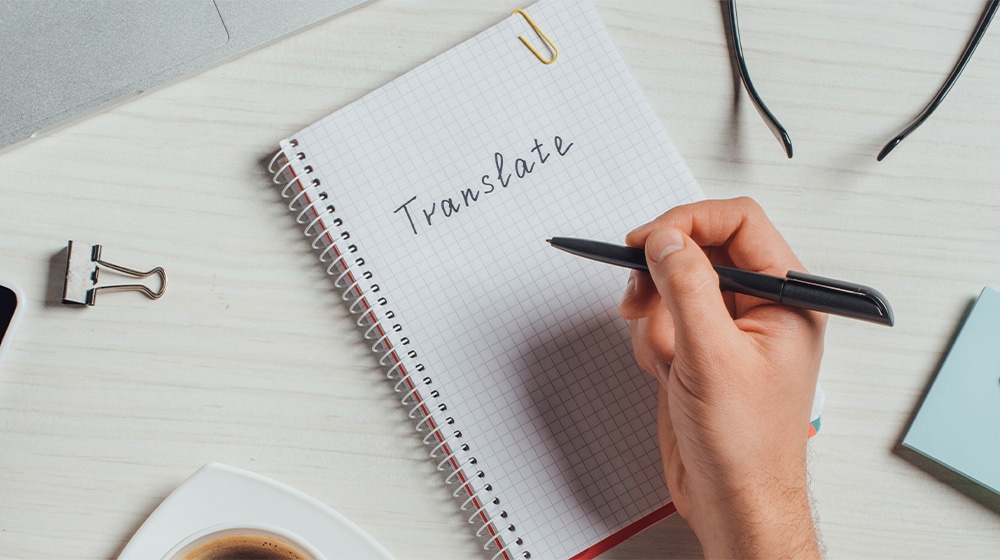
Speaking of contracts, you'll want a contract to go along with your freelancers, as well. Agencies typically have their own contracts as well. You may also have them sign an NDA, verify that they're HIPAA compliant, or some other form of paperwork.
There are many unique challenges with hiring a translator, no matter how you go about it. Translation is often a blind project; that is, you can't verify the results through your own judgment because you don't know the target language. If you did, you could translate it yourself, right? Well, maybe, but that's beside the point. This is why having your translations verified can be a good idea.
If you're in the market for various kinds of creative content, like blog writing, eBook writing, editing, transcription, or technical writing, we have guides for those as well. You can also feel free to drop me a line; I'm always happy to help out!